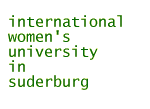| |
Workshop about the individual and global water problem;
July 31st to August 10th, 2000
Teacher: Nana Petzet, Hamburg / Germany
Tutor: Christine Kriegerowski, Berlin / Germany |
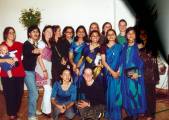
Click on small image to enlarge.
|
Mrs. Petzet's work has dealt with the interdependency and relationship between Art and Science for a long time.
Artists like to accept and use scientific ways of thinking and self-presentation, which is rarely the case with scientists.
The art workshop at IFU was very much like a workshop that would take place at an art school: the participants choose
a topic and afterwards Nana Petzet, Christine Kriegerowski and the group helped each group member to develop and find means of
presenting the topic as an individual, scientifically integrated art project.
Within an artistic presentation of a scientific topic, the art element enables the participating scientists to find a
focus that otherwise might seem to be too humorous, too banal, too moral, too subjective, or too absurd for a scientific context.
- Introduction of Nana Petzet's work
- Participants have choosen a topic, either from their personal scientific background or from the morning lectures.
- The group discussed topics and helped each other to find a special form of presentation
- either a traditionally artistic form: drawing, painting, sculpture, video, photography, performance...
- or a scientific form: lecture, scientific text, article, information exhibit, poster presentation, photo documentation...
- or a mix of the two
- presentation of the seminar results to the IFU water project and at the Open Space in Hannover
All of the results were very complex, both in ecological and political terms.
Most participants tried to raise consciousness levels concerning various water related problems;
in working towards developing a holistic view of the world. Participants preferred Microsoft Office software Power Point as
a method of their presentation - a kind of slide-show / animation with written text that is controlled via computer.
They also used lectures, dance, song, painting, photography and performance to express their results.
The folIowing excerpts of participants' final presentations include the creators' names, the project titles
and a short description of the involved media and projects' content. Underlined project titles indicate an online presentation
available (click on the title). Click on thumbnail pictures for enlarged versions.
| Zahra Khojasteh (Iran): |
FISH & FLOWER |
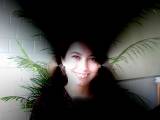 |
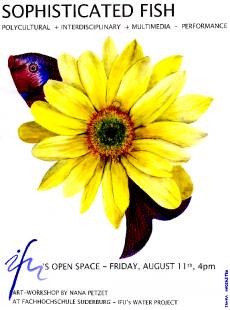 |
Logo / poster:
Zahra Khojasteh's painting and poster contributed enormously to our presentation at the Open Space in Hannover -
It was supposed to be the most beautiful poster there and the ifu Suderburg participants had to prevent
people from stealing it. It also helped giving the group a feeling of identity by visualizing the presentation title,
and lending an esthetic frame to the lectures. |
| Lúcia Schild Ortiz (Brazil): |
WOMEN THOUGHTS ON WATER AND LIFE |
MS Power Point presentation:
Photos of women and situations at the ifu water project, supported by quotations from a number of women. They
give an idea of the potential, desire and power of women to change the world. |
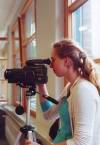 |
|
Sutapa Ghosh, Nandini Sankarampadi Nadadur and Smita Chandra (all India): |
THE HOLY DIP |
MS Power Point presentation with Indian dance and music:
The river / the goddess Ganges talks about her life from her spring to the sea. She talks about
the beauty of the landscape and ecological problems. |

 |
| Winnie Chang (Taiwan): |
A FISH IN A FISH BOWL |
Lecture with chalk drawings on the blackboard:
Winnie Chang tries to raise her audience's consciousness to the fact that the earth is a closed ecosystem, and that
the current manner of exploiting it, and the utilitarian or capitalist philosophy behind it are fatal. She concludes that
instead of considering animals and plants as genetic pool, we need to believe in something else: to have
"the kind of belief that was shared by many early human civilizations: coexistence with other living beings, all together in harmony". |
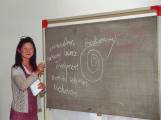
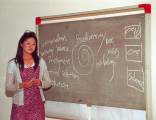 |
| Yadira Cordero (Ecuador): |
MANGROVES - THE WALKING TALKING TREES |
 |
MS Power Point presentation:
Yadira Cordero lets the mangroves speak as comic characters. We are told that they protect shores
and living beings with their intricate network of roots. Also they are concerned about what will happen
to this environment when they disappear because of people cutting them for fire wood and commercial breeding of shrimps. |
| Wilna Venter (South Africa): |
A JOURNEY THROUGH THE DESERT OF PATRIARCHAL
APARTHEID |

 |
Lecture:
Wilna Venter from South Africa describes her life's route from a white farmer's daughter - racial
bias included who had a wish of being a missionary to becoming a philologist and gender studies
scholar. Finally, she not only marries a black South African but also has a child with him. This child,
for Wilna, is a symbol of South Africa's future of differences in harmony and togetherness. She ends
her lecture by singing the South African national anthem, which is written in several South African languages. |
| Ligia Alves dos Santos Semrau (Brazil) and Johara Bellali (Luxembourg): |
CIVILIZACTION 21 |
Lecture and Collages:
This project is another example of the very concrete desire of the water project participants to organize and change the world.
Johara Bellali and Ligia Alves dos Santos Semrau transformed the seminar room into a discussion club while they were working
on their collages. The topic of MENTAL POLLUTION, and how to act against it, was on the agenda and also was the subject of their art works.
In her lecture Ligia Alves dos Santos Semrau advertised the formation of an NGO at the ifu water project.
|

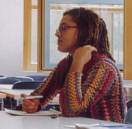 |
| Verena Brand (Germany): |
BASIC NEEDS & HIGH TECH |

 |
Poster presentation:
Using the form of a classical scientific presentation, Verena Brand questions the notions of science and medical research as
progress. Her thesis: vast amounts of money are spent in attempting to make eternal life possible for the inhabitants of the
rich countries. Meanwhile in the poor countries a lot of children could be saved from death by simply improving water quality.
Medical research seemingly is not about health for everybody or progress, but rather about health as a commodity. |
| Mirela Anghelache (Romania): |
ART & SCIENCE |
Video presentation:
What does it take to catch a fish? You need technique (Art), experience and knowlegde (Science).
In her video Mirela Anghelache shows a fisherman in the Danube delta and advises us to learn from him. |
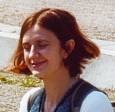 |
| Dolly Wittberger (Austria): |
WAS AM WILL BE |
MS Power Point presentation:
Dolly Wittberger is both influenced by Hinduism and questions surrounding female geniuses. She asks
why women don't leave traces, and why they should do so. Photographing their bare feet on a water surface,
she answers the questions: traces are too static if everything flows. |
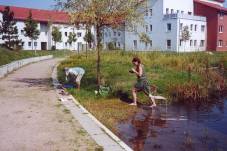 |
The workshop took place at exactly the right time for the group. Lecture time had obviously left a number of water project
participants slightly frustrated because there wasn't enough time provided for exchange of their own knowledge and
background. The workshop, "Sophisticated fish, allowed participants to express themselves, to discuss within the curriculum,
and to find adequate means and media of conveying opinions, knowledge, worries, and background.
The limited time they had and the task of presenting the workshop results at the Open Space made it necessary to work very concentratedly.

 |
Left: Mrs.Nana Petzet with Christine Kriegerowski. Right: Suderburg ifu students amongst the
audience at the Open Space in Hannover.
|
The permanent presence of the ifu students on the campus in Suderburg made it easier to prepare the final presentation.
The staff of the computing dept. was very helpful even after their working hours. Apart from the PC's and useful software,
technical resources were hard to access in Suderburg. Interestingly, the project did not lose consistency because
of it's thematic openness. The communal background and the project discussions formed a relatively binding context.
Without being explicit, ecofeminism was the subject of the whole project.
(text adopted from Christine Kriegerowski)
| |
